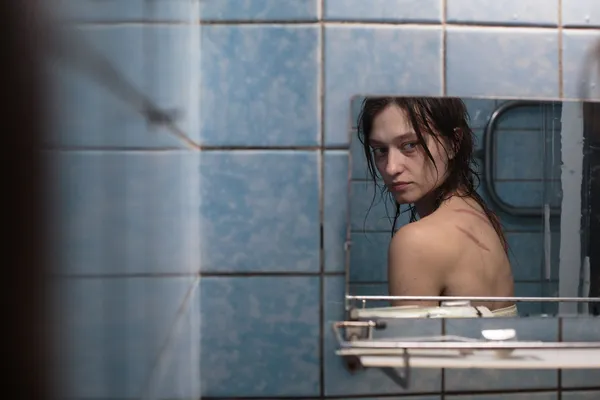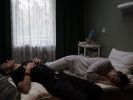Eye For Film >> Movies >> Butterfly Vision (2022) Film Review
Butterfly Vision
Reviewed by: Amber Wilkinson

Like Sundance World Dramatic Competition winner Klondike, this fiction feature debut from Maksym Nakonechnyi, which played in Un Certain Regard at Cannes, is a reminder that for many in the Donbas region of Ukraine, the conflict with Russia didn’t begin on February 24 but has been rumbling on one way or another since 2014. It also shares with Klondike a female-centric perspective and a central message about stoicism in the face of horror, societal desensitisation and the collateral damage of war.
The focus is Lilya (Rita Burkovska), a Ukrainian soldier specialising in drone aerial surveillance – nicknamed Butterfly by her comrades - who was captured and is being returned to her homeland in a prisoner swap. She is played with an outward self-control by Burkovska even as we see the visible scars she has from beatings in detention are just the beginnings of her trauma. Lilya is caught in a media storm as well as adjustment turmoil, whether it is the people watching a news report online and offering thumbs up emojis or comments like, “God what happened to her gorgeous hair?” or her mum recalling how Lilya’s captors would text her grandmother horrific messages from her granddaughter’s phone. Lilya’s husband, and fellow solider, Tokha (Liubomyr Valivots), meanwhile, is harbouring a barely repressed anger over Lilya’s capture which is leading to his own unpleasant radicalisation, an element that shows Nakonechnyi has no interest in producing a propaganda film.

Nakonechnyi comes from a documentary background, which provided the inspiration for his film, co-written by the director of Donbas-set The Earth Is Blue As An Orange Iryna Tsilyk, and it also shows in the general shooting style used by Khrystyna Lizogub. Lilya’s treatment while captive is only glimpsed in brief flashbacks, which avoid voyeurism and suddenly occur like glitches in the film, the image pixellating as though it is buffering, to reveal a scrap of memory.Thanks to the general air of naturalism that has been created and the suddenness of these events it also proves jolting for the viewer, giving a sense of what it must be like for those whose post-traumatic trauma emerges unbidden at unexpected moments. The director also adopts the bird’s eye view of Lilya’s drone for dream sequences – which feel rather extraneous by comparison – in which she often sees a butterfly as big as a bird flapping its wings. Particularly shocking is a dream sequence in which Lilya imagines herself in front of Kyiv’s Olympic stadium, standing in bombed out ruins – something that, in the light of recent events in the country, takes on a shuddering resonance.
The film shows how, as conflict grinds on, it seems there’s little time for heroes, as we see Lilya struggle to get the free bus travel she is entitled to but on the other hand, as someone notes, “The war is not fucking over”. Burkovska doesn’t just bottle Lilya’s emotions, she shows how that very act of bottling them is not necessarily a welcome or deliberate choice but itself a lingering element of her experience. As Lilya slowly but determinedly moves on with her life in the way she, rather than others, deems fit, Burkoska takes us with her, the very nature of her understated performance encouraging us to lean in more closely and pay attention to it.
Reviewed on: 01 Jun 2022
















